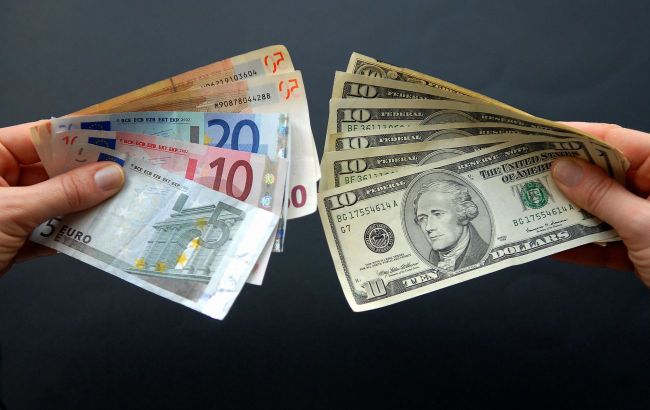Billions in dollar and euro banknotes flow into Russia despite sanctions - Reuters
 Photo: Cash dollars and euros continue to flow into Russia (Getty Images)
Photo: Cash dollars and euros continue to flow into Russia (Getty Images)
Since the US and EU banned the export of their banknotes to Russia in March 2022 following the invasion of Ukraine, some $2.3 billion in dollars and euros have been smuggled into the country, Reuters reports.
Customs data obtained from a commercial vendor that records and collects information shows that the cash was transported to Russia from countries such as the UAE and Türkiye, which have not imposed restrictions on trade with Russia. The country of origin of more than half of the total amount is not specified.
The previously unpublished data shows that Russia has managed to circumvent sanctions that block cash imports and demonstrates that dollars and euros remain useful tools for trade and travel, even as Moscow seeks to reduce its dependence on hard currencies.
In December 2023, the US government threatened fines to financial institutions that helped Russia circumvent sanctions and imposed sanctions on third-country companies for 2023 and 2024.
The Chinese yuan has overtaken the US dollar to become the most important foreign currency in Moscow, although significant payment problems persist.
Dmitry Polevoy, head of investment at Astra Asset Management in Russia, said many Russians still want to have cash foreign currency for traveling abroad, as well as for small imports and domestic savings. "For individuals, the dollar is still a reliable currency," he told Reuters.
Russia began calling the dollar and euro "toxic" in 2022 as sweeping sanctions cut off its access to the global financial system, making payments and trade more difficult. About $300bn of the Bank of Russia's foreign exchange reserves in Europe have been frozen.
The customs records cover the period from March 2022 to December 2023, and Reuters was unable to access more recent data.
The documents showed a surge in cash imports just before the invasion. Between November 2021 and February 2022, Russia received $18.9 billion in dollar and euro banknotes.

Photo: Reuters
Daniel Pickard, head of the international trade and national security group at US law firm Buchanan Ingersoll & Rooney, said the sharp rise in shipments before the invasion suggests that some Russians wanted to protect themselves from possible sanctions.
Restricted flows
Russia's central bank quickly restricted the issuance of cash foreign currency to individuals after the invasion of Ukraine in an attempt to support the weakening ruble. From February 2022 to the end of 2023, only $98 million in dollar and euro banknotes were reportedly taken out of Russia.
By contrast, the inflow of foreign currency was much higher. The largest declarant of foreign currency was a little-known company called Aero-Trade, which offers duty-free trading services at airports and onboard aircraft. During this period, it declared about $1.5bn in bills.
Aero-Trade registered 73 shipments of $20 million or €20 million each, all of which were cleared through customs at Moscow's Domodedovo airport. The shipments were described in the customs declarations as exchanges or proceeds of trade on board. In most cases, Aero-Trade was listed only as the declarant, the organization that prepares and submits the customs documentation.
According to customs records, one €20 million shipment handled by Aero-Trade was imported last February by Yves Rocher Vostok, a subsidiary of the French cosmetics group Yves Rocher, which still operates dozens of stores in Russia. The data does not indicate the country of origin or the name of the supplier.
Gold, weapons, banking
According to customs records and a source familiar with the transactions, more than a quarter of the $2.27bn in banknotes was imported by banks, most of it used as payment for precious metals.
Several Russian banks received cash worth $580 million from abroad between March 2022 and December 2023 and exported roughly equivalent amounts of precious metals. In many cases, gold or silver shipments were sent to companies that supplied the banknotes, records show.
For example, Russian lender Vitabank imported $64.8 million worth of banknotes from Turkish gold trading company Demas Kuyumculuk in 2022 and 2023. During the same period, Vitabank exported gold and silver worth USD 59.5 million to the Turkish company.
A source familiar with Demas's operations confirmed that the company was involved in a series of cash-for-gold transactions involving Vitabank and two other Russian lenders between March 2022 and September 2023.
According to the source, shipping banknotes from the UAE to Russia was the only solution Demas found to complete long-term contracts signed before Western sanctions came into effect with Russian gold suppliers. According to this person, the sanctions effectively cut Russia off from the Western financial system, and payment of bills via traditional bank transfers became impossible.
Documents show that other large cash importers included companies controlled by the state military-industrial conglomerate Rostec.
According to the National Bank of Ukraine, in just one month, June 2024, $1.3 billion worth of cash was imported into Ukraine.

